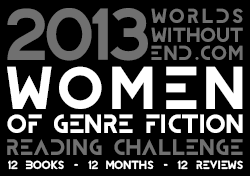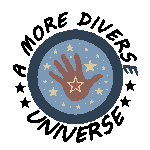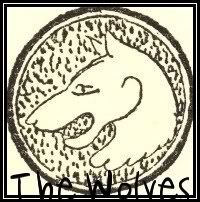I’ve been planning to properly review both Blood Red Road by Moira Young and Divergent by Veronica Roth for several weeks now, because I read them specifically (although conveniently) for the 2013 Women of Genre Fiction Reading Challenge. After languishing on my TBR pile for several years, they made it across the void only to end up languishing on my ‘books to review’ (BTR) pile. To my mild disappointment both books elicited a rather underwhelming “Meh…” reaction from me, and therefore the inspiration to write about them has been lacking. Today though, I finally hit upon what I really wanted to say about them, and a bit about what I see and hope for in YA speculative fiction in general.
These are not bad books by any means. I would probably recommend them both. They feature a dystopian/post-apocalyptic world with some original details, and a relatively interesting female lead.
 Saba’s voice in Blood Red Road is distinctive and Young’s decision to write the whole story in first person and in dialect just about works. A wasted land, where rusted out shells of a civilization that hints at ours dot the landscape, is sketched in quick, blunt strokes (I couldn’t stop picturing something along the lines of The Book of Eli, a movie I sort of hated actually…) When Saba’s twin brother Lugh is captured by four mysterious horsemen, she leaves the only corner of the world she’s ever known, aiming to get him back. With her little sister Emmi dogging her steps and getting in her way, Saba faces numerous obstacles and discovers in herself a fierce warrior. What started as a rescue mission turns into an epic battle that will influence the course of many of the lives lived along the dusty red road.
Saba’s voice in Blood Red Road is distinctive and Young’s decision to write the whole story in first person and in dialect just about works. A wasted land, where rusted out shells of a civilization that hints at ours dot the landscape, is sketched in quick, blunt strokes (I couldn’t stop picturing something along the lines of The Book of Eli, a movie I sort of hated actually…) When Saba’s twin brother Lugh is captured by four mysterious horsemen, she leaves the only corner of the world she’s ever known, aiming to get him back. With her little sister Emmi dogging her steps and getting in her way, Saba faces numerous obstacles and discovers in herself a fierce warrior. What started as a rescue mission turns into an epic battle that will influence the course of many of the lives lived along the dusty red road.
I think my main problem with Blood Red Road is that I never got round to liking Saba. She kind of annoyed the crap out of me. I kept wishing that the story was about Emmi, the little sister whom Saba spends most of the book resenting. Emmi was plucky and inventive and resourceful and paid a whole lot more attention to the important things than Saba. The book also employs two out of five of the most overused plot devices in YA Fiction (as detailed here by Adam of Hitting on Girls in Bookstores) – ‘I need to rescue my brother!’ and the ‘super mysterious male character’. As Adam points out, plot devices aren’t inherently bad things – they just need to be used with skill and creativity if they enter the story. Young doesn’t handle them particularly well in my opinion – and although I have no tolerance for lazy writing, I will cut her some slack because other elements of the story have potential (and not because this is her first book). Emmi, for instance, is a good character – and the gang of girl revolutionaries that Saba encounters are badass and awesome and I hope they feature hugely in the next Dustlands book (Rebel Heart, which I will undoubtedly read sooner or later…)
As for Divergent… In this version of Chicago, everyone has been split into five factions, based on the belief that the world went to hell because people lacked one specific virtue – and that virtue is what each faction now strives to embody utterly. Thus Abnegation strives for total selflessness, Erudite for intelligence, Amity for peace, Candor for honesty, and Dauntless for bravery. The various factions control different elements of society (Abnegation mostly takes care of government, the Erudites are scientists, Dauntless obviously covers security, etc.) and none of them get along very well. Beatrice grew up in Abnegation, but when it comes time to choose the faction she will spend her adult life in, she discovers that she is Divergent – she displays a tendency toward more than one virtue. Egads! She joins Dauntless and begins training as a fighter, and almost immediately finds herself embroiled in all that is not well beneath the surface of the faction system.
The world building here is quite interesting, and a few tough ideas are toyed with. I liked Tris right off (she’s tiny, like me!) and even though I found her to be a bit dense at times, overall I was rooting for her. She was imperfect and uncomfortable and no savior – just a pretty regular girl trying to do the right thing in a rough situation – and therefore touched by the extraordinary. I read this book in an afternoon, and I found it to be compelling and creative. Therefore the rather glaring use of the ‘super mysterious male character’ ploy was especially disappointing. I’m getting really tired of one-dimensional male love interests – and no, (as Adam points out in his recent post) making them slightly brooding, giving them past traumas they’re still coping with, tattoos and glorious abs, does not make a real boy. It’s just lazy writing!
One of my first thoughts after finishing Divergent was, “Why the heck can’t anyone be bothered to write characters like Corlath (from Robin McKinley’s The Blue Sword) anymore?” *heavy sigh* That literary crush will be with me until I die…!
I do appreciate that both Roth and Young wrote stories about women who fight. I think that’s important. I like what Kameron Hurley says here in her essay We Have Always Fought: Challenging the ‘Woman, Cattle and Slaves’ Narrative (found on Aidan Moher’s blog A Dribble of Ink):
Stories tell us who we are. What we’re capable of. When we go out looking for stories we are, I think, in many ways going in search of ourselves, trying to find understanding of our lives, and the people around us. Stories, and language tell us what’s important.
If women are “bitches” and “cunts” and “whores” and the people we’re killing are “gooks” and “japs” and “rag heads” then they aren’t really people, are they? It makes them easier to erase. Easier to kill. To disregard. To un-see.
But the moment we re-imagine the world as a buzzing hive of individuals with a variety of genders and complicated sexes and unique, passionate narratives that have yet to be told – it makes them harder to ignore. They are no longer, “women and cattle and slaves” but active players in their own stories.
Roth and Young succeed in bringing to life women who are hard to ignore, and kudos are due to them for that. It’s a step in the right direction. But the issue is more complex, which is why I keep coming back to Adam’s post. Even in books like Blood Red Road and Divergent, where female leads kick ass, there are other troubling things. Gender roles still matter, looks still matter. I can’t imagine the hotty leading men are helping any boy readers out there with their own body issues (a.k.a. if you want to win the beautiful kick ass girl you must be darkly handsome and have abs like The Situation’s!) This is no more acceptable than sticking women and cattle and slaves in a different category than men.
We’re all that ‘buzzing hive of individuals‘, as Hurley writes. We all have “a character as a human being, regardless of the distinctions of sex” according to Mary Wollstonecraft.
 Which brings me to the last book languishing on my BTR pile – a collection of stories called Diverse Energies edited by Tobias S. Buckell and Joe Monti. Both editors have a very mixed identity, and growing up they didn’t find faces they recognized in the stories they read. As adults they still didn’t find many books that reflected the “wonderful, blended, messed-up world” they knew, or where people from “my pale relatives to my dark-skinned ones” were represented. Following the mayhem that ensued when the whitewashing of YA fiction cover art drew national attention, culminating in RaceFail 09, the editors chose to do something constructive instead of just joining the general fray. This book is the result, and it features short stories set in the future, where “having people of color/Caucasian/LGBT protagonists…is not a brick thrown at a window; it is the continued paving of a path.”
Which brings me to the last book languishing on my BTR pile – a collection of stories called Diverse Energies edited by Tobias S. Buckell and Joe Monti. Both editors have a very mixed identity, and growing up they didn’t find faces they recognized in the stories they read. As adults they still didn’t find many books that reflected the “wonderful, blended, messed-up world” they knew, or where people from “my pale relatives to my dark-skinned ones” were represented. Following the mayhem that ensued when the whitewashing of YA fiction cover art drew national attention, culminating in RaceFail 09, the editors chose to do something constructive instead of just joining the general fray. This book is the result, and it features short stories set in the future, where “having people of color/Caucasian/LGBT protagonists…is not a brick thrown at a window; it is the continued paving of a path.”
The collection is decent, drawing from the work of both brand new and old writers. Each story is set in a dystopian world in which a child or young adult is striving to survive and understand whatever type of horror or wonder has beset them. Pitted against governments or the environment, students and child laborers, street kids and goodie girls seek answers and basic human dignity and connection.
With the exception of Ursula K. Le Guin’s unsurprisingly spectacular Solitude, none of the stories particularly grabbed me. Many of them seemed like great ideas that were begging to be transformed into longer pieces. Seen as a whole, though, I think the book is an excellent comment on the necessary direction speculative fiction needs to take. I will definitely keep an eye out for more work from several of the authors included in the collection, in the hope that they will continue paving the path in the rest of their writing.
I have a lot of respect for authors, like Roth and Young, who recognize the power that stories have and seek to use that power for good. I do think they could be doing better though. It’s possible that my expectations are too great, but I don’t really accept that. There are authors (like Ursula K. Le Guin) who have proven that it is possible to write gutsy, important stories that do indeed show us what we’re capable of and help us to develop our character as human beings.
I’ll continue to look for those stories, and to the best of my ability, share them, tell them, and let them come to life within me.





I like that, about how the use of popular devices aren’t bad in themselves, it is the creativity in which the author incorporates them that tests skill. And I do see what you mean about lazy writing in Divergent (which is the only one of the above I’ve read).. I am curious about whether some of these manuscripts get rushed through to hit the market at the right time…
With popular fiction, are we supposed to expect more? I’m often told I shouldn’t. they are “entertaining” reads, L!’–entertainment does not require much, apparently. Problem is: I happen to find good writing entertaining. Why should I ingest anything of poor quality when I have only to go to the next table and find *all* my needs met? Especially once I’ve discovered there is a next table.
LeGuin, especially in short story, really sets the bar high. But really, when you taste works that good, can you go back? and why should you be made to regret it? I catch myself apologizing sometimes, as if I shouldn’t expect much–as if it is a mean thing to do to an author, but I am going to continue on expecting more. I’m glad to hear you are, too.
By: L on May 26, 2013
at 9:11 pm
An audience that tolerates shoddy writing encourages more lack-luster fluff, so yes indeed, let’s expect and demand something better, since that’s what we really want to be reading! I like an entertaining book, but I’ve reached the point where I’m unwilling to ingest the poor quality stuff, as you say, and if I come across it masquerading as quality I am willing to point it out – in the hope that the authors will accept the challenge to do better. Le Guin, and Diana Wynne Jones, and Paolo Bacigalupi, and Robin McKinley prove that our high bar can be reached and even surpassed – thank goodness!
I do think you point to an element of this that I didn’t touch on – the mechanisms and manipulations of the publishing world. I think most authors find themselves compromising to some extent, and bowing a bit (or entirely) to the whims of the market. That market supposedly is based on OUR whims though – so again, let’s demand something better.
By: tuulenhaiven on May 27, 2013
at 1:39 am
I agree that Four was not as developed as a character as I would have liked. Over all I found Divergent a good fun read, but I haven’t been recommending it to anyone. Bitterblue is one of my favorite coming of age stories for young women that I’ve read in recent years. She isn’t perfect, she’s a little ignorant of what is happening around her, but she isn’t naive and she spends the entire book hunting down the truth and dealing with it. I loved that book!
By: Jami Zehr on June 6, 2013
at 12:39 pm
Bitterblue is quite good, I agree! Cashore is an excellent writer. I’ve been impressed with Rae Carson’s books lately too. Her characters avoid a lot of tropes and are interesting and distinctive – especially her female characters, but her male characters are decent too. 🙂
By: tuulenhaiven on June 6, 2013
at 12:53 pm
I haven’t read any of Carson’s books yet, but I’ll have to put those on my list!
By: Jami Zehr on June 6, 2013
at 12:55 pm
[…] tales of women) and they’re about women who fight – bonus! My expectations are still great though, so I have to point out that the second Dustlands book didn’t really improve on the […]
By: Digging Up Some Long-Awaited Reads | what we have here is a failure to communicate on January 30, 2014
at 9:09 pm